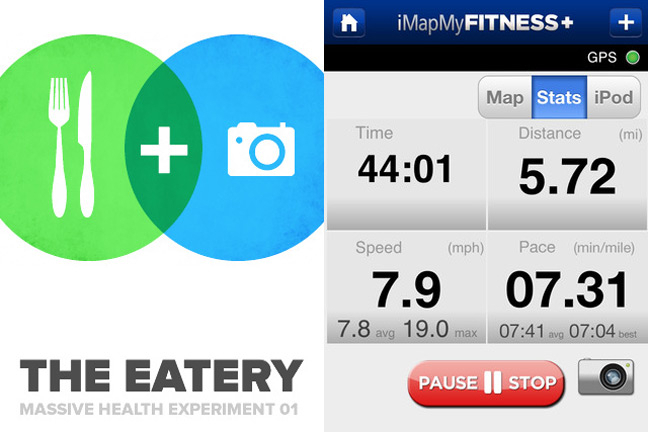5 Serious Reasons Your Weight-Loss Efforts Could Be Failing
Weight loss can be challenging, sure, but it shouldn’t be impossible. If you're carefully tracking your calorie intake and logging your workouts and still aren't seeing results, you may want to call your doctor—especially since Ellen Manos, M.D., says that weight-related diseases and conditions can be more common in women than in men.
Irregular periods can be a sign that something is off that could be affecting your weight, says Manos. (The same hormones that affect your cycle can also impact your poundage.) Other symptoms to keep an eye on include unusual fatigue, acne, and hair growth or loss.
If you experience a slow-and-steady weight gain that seems to have no obvious explanation, Manos suggests going to a doctor to see if you could have one of the conditions below.
1. Chronic Stress
The adrenal glands respond to chronic stress (a state of constant anxiety that continues over a period of months, maybe as a result of an event like a death) by increasing the production of cortisol, a.k.a. the stress hormone. "If your adrenal glands are stressed, you’re going to have abnormalities," says Manos. A challenge to the adrenal glands can, ultimately, undermine your metabolism.
A study conducted at the Ohio State University found that women who experienced a stressor within 24 hours of eating a meal of 930 calories and 60 grams of fat burned 104 fewer calories than women who hadn’t experienced a stressor. The conclusion? Stress can cause an estimated 11 pounds of weight gain per year in women.
To fix the problem of chronic stress, “You have to delve, as a patient, into why you are having these stresses and whether you can make a lifestyle change to make your life less stressful,” says Manos. She adds that techniques for addressing can include exercise and meditation.
RELATED: Outsmart Stress Traps
2. Depression
Depression can manifest itself in a variety of ways, one of which is a change in appetite. “Some people who get depressed don’t have energy for anything and want to eat for comfort,” says Manos. A doctor can help you figure out how to best treat depression if you suffer from it.
3. Hypothyroidism
Hypothyroidism (or an underactive thyroid) causes an upset in the production of thyroxine (T4) and triiodothyronine (T3), hormones that support the metabolism. “It often will hit you when you’re ‘stressed,’ and I put stressed in quotes because it’s mostly physical stress—times when your body is changing,” says Manos. The condition is often associated with puberty or menopause (but not always). Symptoms can include sluggishness and a leaking from the nipples.
The thyroid, which is located at the center of the neck, works with the hypothalamus and the pituitary to support the metabolism. Diagnosis of hypothyroidism includes an examination of the thyroid and a series of blood tests. Treatment of hypothyroidism involves the hormone levothyroxine, which is typically taken daily to reverse symptoms such as chronic fatigue, high cholesterol, and weight gain.
RELATED: 9 Things That Mess with Your Hormones
4. Polycystic Ovary Syndrome
Polycystic Ovary Syndrome (PCOS) is when a patient has benign cysts on her ovaries, as connected with an imbalance of hormones in the blood. Patients with PCOS have high levels of "male" hormones (progesterone and testosterone), which affects their ability to ovulate and can cause acne and growth of hair on the body/face (in addition to obesity).
According to a study in The Journal of Clinical Endocrinology and Metabolism, PCOS is associated with a higher risk of gestational diabetes and type 2 diabetes, independent of BMI. But by addressing your weight (with or without medication), you may be able to ease your symptoms of PCOS—and decrease your risk of these types of diabetes. "So the good news is you effect the change,” says Manos.
5. Type 2 Diabetes
Type 2 diabetes is a resistance to insulin, which affects the metabolization of glucose. "You can’t concentrate because your sugar goes up," says Manos. "You might get a little hyper, but when it bottoms out you’re out of it." Symptoms can also include increased thirst or hunger as the body works to process and eliminate the glucose.
Before developing type 2 diabetes, you may experience insulin resistance syndrome or prediabetes. At this stage, you can reverse the trend with changes to diet and exercise, so it’s important to receive an evaluation with a blood glucose test ASAP.
RELATED: 5 Ways to Eat Less Without Getting Hangry
-
Little changes can give big results
-
Why drinking water can help you lose weight
-
Buy a recipe book for weight loss
-
Eat tofu and eat less
-
Controlling your weight
-
9 Trainers Share the Top Weight-Loss Mistakes People Make in the Gym
Hitting the gym is about a hell of a lot more than crushing calories,
- DON'T MISS
- 5 Power Foods That Can Help You Drop a Size
- Easy ways to kick-start weight loss: We share tips and tricks
- Exercise is essential for weight loss
- What is the best exercise if Iâm overweight?
- 10 Tips to beat the bulge this festive season
- Eat what you want and still lose weight
- Do what exercise you love
- Dont compare your weight to your husbands
- This Surprising METAL Might Help You Burn More Fat
- Good carbs vs bad carbs




